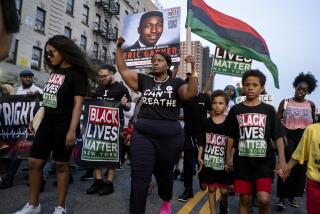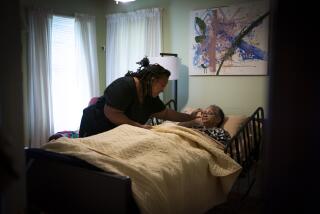Hypertension Takes a Deadly Toll : Stroke, the Silent Killer, Targets Blacks
NEW YORK — Black Americans are the targets of one of the country’s top killers--stroke--whose cause can be as silent as it is deadly.
For reasons perplexing to researchers, blacks in this country are highly vulnerable to stroke from severe forms of untreated high blood pressure, which can remain hidden until it is too late.
Hypertension experts said in recent interviews that blacks need treatment as well as awareness of the disease if they are to cut its death toll.
National Campaign
“It is a symptomless, silent killer,” Dr. Elijah Saunders of Baltimore said of high blood pressure. “When it’s up for a long time and severely (high), there can be all kinds of symptoms, but that’s kind of late by then.”
Stroke is America’s third major cause of death, after heart disease and cancer.
Saunders, president of the Assn. of Black Cardiologists, is part of an ongoing national campaign against high blood pressure that is oriented toward blacks.
Black men and women are nearly twice as likely as whites to have high blood pressure, with one in four blacks believed to be hypertensive.
For blacks, hypertension is almost the sole cause of strokes, which afflict 500,000 people and kill more than 155,000 people each year. Hypertension has no known cure, but if detected can be controlled with lifelong medication.
However, past studies in several southeastern cities have found that public education alone is not enough. Awareness of hypertension was high in the region, but so was the rate of fatal strokes among blacks.
“We want to let people know there are good treatments for it,” said Saunders, whose organization “HealthPITCH,” an acronym for People Involved To Control Hypertension, plans to stage health fairs in eight major cities to promote treatment as well as awareness.
Health experts urge people with high blood pressure to stay on their medication and talk to their doctors if they experience troubling side effects. With the range of medications available, adjustments may be possible.
“This is not just a garden-variety screening program. It’s one where the medical referral and follow-up mechanism is built in,” he said.
The program was tested last year in some cities in the Southeast, where an earlier survey showed such an alarmingly high incidence of stroke that the Sun Belt’s 14 contiguous states have been dubbed the “stroke belt.”
“A black man living in Savannah, Ga., has 10 times the chance of getting a stroke than a white male in Baltimore, if both are in the 35-55 age group,” said Dr. Edward Cooper, professor of medicine at the University of Pennsylvania School of Medicine in Philadelphia.
“We have a clear stroke belt. The Sun Belt is our stroke belt,” said Dr. Edward Roccella, coordinator of the National High Blood Pressure Education Program. Stroke deaths for whites were slightly higher in the region, but among blacks the incidence was drastically higher: 125.1 black males and 97.8 black females out of every 100,000 had strokes, contrasted with 87 black males and 77 black females for every 100,000 people living in other sections of the United States. The 1985 federal figures were adjusted to account for differences in the age of the population.
“When you break the data down by regions, it’s enough to get excited about,” Roccella said. “It got us thinking, ‘What is going on in the South?’ ”
Controlling for variables such as social, economic and age factors, Roccella found that, while awareness and even treatment of high blood pressure is high among blacks in the Southeast, the population also tends to be heavier than their counterparts elsewhere.
Causes Not Known
Roccella next plans to examine levels of sodium and potassium among residents of the Southeast.
Potassium deficiencies have been associated with poor control of blood pressure, as has high salt intake and higher volumes of body fluids.
The causes of hypertension are not known, but researchers hope that racial differences may provide clues. Black Americans have the third-highest rate of strokes in the world, ranking behind the Chinese in Taiwan and the Japanese in their native country.
One such clue reported by researchers at a recent American Heart Assn. symposium in San Diego that blacks with high blood pressure have higher volumes of fluids in their bodies than hypertensive whites.
With treatments available, physicians said that getting and staying on medication can be the steepest barrier to the black community’s surviving high blood pressure.
“I’d say the biggest problems are access, motivation and awareness, in that order,” Cooper said.
More to Read
Sign up for Essential California
The most important California stories and recommendations in your inbox every morning.
You may occasionally receive promotional content from the Los Angeles Times.










